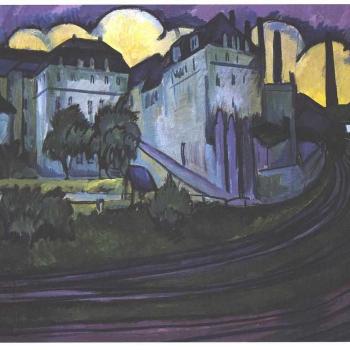It was not, however, simply Mounier who came to this connection. Here is Peter Maurin drawing on the same spirit (here mostly of personalism, though it is clear that he also read Proudhon):
Patrick Henry said.
“Give me liberty,
or give me death!”
What makes man
a man
is the right use
of liberty.The rugged individualists
of the Liberty League,
the strong-arm men
of the Fascist State
and the rugged collectivists
of the Communist Party
have not yet learned
the right use
of liberty.
Read Freedom in the Modern World,
by Jacques Maritain.
And then, of course, there’s Dorothy Day:
Well, we [Catholic Workers] are very much interested in anarchist thought, because a man named Peter Kropotkin wrote a book called Fields, Factories, and Workshops, and he believed that all reform should begin from the bottom up, rather than from the top down […] They, through their organization and through their dedication to bettering conditions begin right where they are. In France, they would call it a personalist position.
And here is Day sounding almost exactly like Mounier above:
How many thousands, tens of thousands [of prisoners], are in for petty theft, while the ‘robber barons’ of our day get away with murder. Literally murder, accessories to murder. “Property is Theft.” Proudhon wrote–The coat that hangs in your closet belongs to the poor. The early Fathers wrote—[t]he house you don’t live in, your empty buildings (novitiates, seminaries) belong to the poor. Property is Theft.
Lastly, an example from Ammon Hennacy. Here we can very clearly see how, for these men and women, anarchism represents both an affirmation of individual responsibility (central to the Christian tradition) alongside the necessary injunction to assist and, above all, love the poor:
A Christian Anarchist does not depend on bullets or ballots to achieve his ideal; he achieves that ideal daily by the One Man Revolution with which he faces a decadent, confused and dying world.
Anarchism thus appealed to them precisely because, in its communitarian or social instantiation, it represented a via media, a way to minimize complicity in what Dorothy Day once (may have) called “this rotten, decadent, putrid industrial capitalist system which breeds such suffering in the whited sepulcher of New York,” even as it refused to deny the individual human being responsibility and dignity. Anarchism became a way of politicizing the personal conversion required of those who follow Christ, a way of resisting the bourgeois status quo without signing up to serve “the Party.” For them “property” was indeed theft, not because it was wrong to own anything per se, but, because, as Aquinas wrote, echoing the Fathers:
[W]hatever certain people have in superabundance is due, by natural law, to the purpose of succoring the poor. For this reason Ambrose [Loc. cit., Article 2, Objection 3] says, and his words are embodied in the Decretals (Dist. xlvii, can. Sicut ii): “It is the hungry man’s bread that you withhold, the naked man’s cloak that you store away, the money that you bury in the earth is the price of the poor man’s ransom and freedom.”
Perhaps unexpectedly, it also became a way of practicing pacifism. Although many anarchists committed violent acts, in the hands of these Christians, the anarchist emphasis on mutual aid and responsibility (as opposed to the class war they saw in Soviet thought) led unequivocally to a non-violent way of life. Again, Ammon Hennacy:
Despite the popular idea of anarchists as violent men, Anarchism is the one non-violent social philosophy.… The function of the Anarchist is two-fold. By daily courage in non-cooperation with the tyrannical forces of the State and the Church, he helps to tear down present society; the Anarchist by daily cooperation with his fellows in overcoming evil with good-will and solidarity builds toward the anarchistic commonwealth which is formed by voluntary action with the right of secession.
In support, again Dorothy Day:
What do you mean by anarchist-pacifist?” First, I would say that the two words should go together, especially … when more and more people, even priests, are turning to violence, and are finding their heroes in Camillo Torres among the priests, and Che Guevara among laymen. The attraction is strong, because both men literally laid down their lives for their brothers. “Greater love hath no man than this.” “Let me say, at the risk of seeming ridiculous, that the true revolutionary is guided by great feelings of love.” Che Guevara wrote this, and he is quoted by Chicano youth in El Grito Del Norte.
One final point: many may say that the hierarchy of the Church is a clear example of why anarchism cannot be compatible with Catholicism. This, however, confuses several things. First, the modern State does not equal all forms of personal and communal governance (coops, credit unions, voluntary mutual-aid associations, etc.). Second, resistance to the intrinsically unjust capitalist state is an exercise in revolt against a—by definition—unjust authority. The Church, in the eyes of these anarchists, is not an unjust authority (but rather perhaps the most just authority that can exist). Lastly, this makes individualist anarchists out of those who were and are communitarians. Their rebellion again corrupt power structures is a rebellion against something secular; spiritual authority is another matter entirely;. In short, they did not simply hate authority for its own sake. A final Dorothy Day quotation ought to drive this home:
I had a conversation with John Spivak, the Communist writer, a few years ago, and he said to me, “How can you believe? How can you believe in the Immaculate Conception, in the Virgin birth, in the Resurrection?” I could only say that I believe in the Roman Catholic Church and all she teaches. I have accepted Her authority with my whole heart. At the same time I want to point out to you that we are taught to pray for final perseverance. We are taught that faith is a gift, and sometimes I wonder why some have it and some do not. I feel my own unworthiness and can never be grateful enough to God for His gift of faith. St. Paul tells us that if we do not correspond to the graces we receive, they will be withdrawn. So I believe also that we should walk in fear, “work out our salvation in fear and trembling.”
As for those two other tenets to which the Communists subscribe, I still believe that our social order must be changed, that it is not right for property to be concentrated in the hands of the few. But I believe now with St. Thomas Aquinas that a certain amount of property is necessary for a man to lead a good life. I believe that we should work to restore the communal aspects of Christianity as well as some measure of private property for all.
I still believe that revolution is inevitable, leaving out Divine Providence. But with the help of God and by resorting to His sacraments and accepting the leadership of Christ, I believe we can overcome revolution by a Christian revolution of our own, without the use of force.
Put briefly, then, these brave men and women did not cultivate a tradition wholly alien to the Church; rather, they developed a via media, a commitment to the necessary Christian work of personal responsibility, but always and everywhere in service to the neighbor, always and everywhere filled with love for the poor and downtrodden, those forgotten by the system, those too often ignored (and to this day!) by the be-suited who sit in church on Sunday, only to pass the beggar outside right on by.













